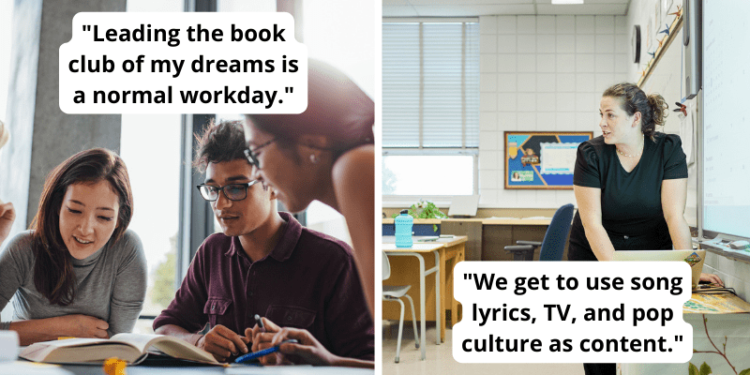Is your desk hiding under stacks of clipped papers that still need grading?
Up past your bedtime, scrolling through argumentative essays from a week ago that you promised to provide feedback for?
Heard another student—in your actual, physical classroom—announce how much they hate reading and writing?
I’ve been there. I’m not sure if I’ve met an English teacher who has not been there. Teaching high school English definitely comes with a unique set of challenges. But when I feel that kind of defeat setting in, as cheesy as it sounds, I think about all the reasons why I chose my content area and age group. Teaching high school English is truly the best. Here’s why.
1. You get to shine a light on the ever-changing lexicon-of-the-youth.
Teenagers love nothing more than having their terminology stolen and dragged through the dirt by The Olds. “Oh, you like my drip? Thank you so much!” “Yes, we do have a quiz today. No cap.” “You think this lesson was mid? I’d argue that this lesson was actually top-tier.” “You want to get sturdy? How about we get those grades sturdy instead?” You can definitely include these in your vocabulary lessons and even delve into the etymology of these words. They absolutely love it when you use it in conversations with them even when they call you a “cringey millennial.” Your English class will be straight bussin’.
2. Their strong opinions provide excellent classroom content.
They have opinions on everything, and they’re not shy about sharing them. They have opinions on what color math is. They have opinions on your lessons. They have strong opinions on feet. (Almost unanimously, they don’t want to see them.) You get to teach them how to grow their opinions into inquiries that lead to research that leads to claims and then become the framework for arguments, bolstered by credible evidence.
3. Sharing your favorite books with them almost feels like you’re leading the book club of your dreams.
Whether you are creating your curriculum from scratch or using textbooks you’ve had since 1998, most English teachers share the words they love to read. I pull in excerpts from Amy Poehler’s Yes Please and Trevor Noah’s Born a Crime when I can. We get to show them the kinds of books that get people to feel things. We get to teach them the lingering power of words, even if it’s a text message.
4. Watching TV shows qualifies as research.
English teachers are always looking for examples they can use in their classroom that can illustrate a literary term in a relatable way because we know that when we ask the question “Who can give me an example of an anti-hero in literature?” we’ll be met with silence or someone who proudly claims, “I only use SparkNotes!” But if we say, “Who’s the anti-hero in Breaking Bad?,” they’ve got it.
5. When they write, you can write.
When I was in middle school, I competed against other schools on a story-writing team. (Where are my fellow Power of the Pen alums at?) But English teachers know that this love of writing is not baseline in high school students, so we have to ignite it in them. I write with my students. I create prompts and assignments that force their brains to find ways to tell stories that were dormant.
6. Sharing music with them (and vice versa) can become their favorite lesson.
We get to use song lyrics as poetry and analyze Taylor Swift’s “All Too Well.” We’ve analyzed Sam Cooke, Tupac, and John Mayer. I love it when students stop me and ask, “Is ‘Japanese Denim’ a metaphor in that Daniel Caesar song? or “Can we just dissect the entire Midnights album?” I add it to the mental list I keep of electives I’d love to teach.
7. You get to know your students in a way that other teachers do not.
In writing, students can be brave, especially if they know that you are the only one reading their papers. We have the privilege of learning their stories. We get Google Docs shared with us of poems they wrote because they felt like it and not because it was assigned. We’re the lucky ones who get invited into their world and encourage them to keep writing.
What’s your favorite part about teaching high school English? Let us know in the comments.




















